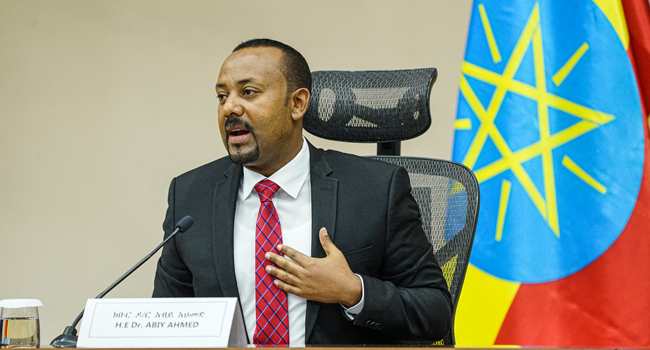Eritrean Forces In Tigray Region, Says Ethiopian PM

![]()
Ethiopian Prime Minister Abiy Ahmed admitted Tuesday that troops from neighbouring Eritrea were present in the conflict-torn Tigray region and suggested they may have been involved in abuses against civilians.
The admission comes after months of denials from Addis Ababa and Asmara, despite mounting accusations from rights groups and residents that soldiers from neighbouring Eritrea had carried out massacres in Tigray.
Abiy sent troops into the semi-autonomous region of Tigray on November 4 after he blamed the state ruling party, the Tigray People’s Liberation Front (TPLF), for attacks on federal army camps.
The military campaign to unseat the TPLF — which dominated national politics for decades — has led to a drawn-out conflict that has seen brutal atrocities carried out against civilians.
In a wide-ranging speech to parliament, Abiy said the “Eritrean people and government did a lasting favour to our soldiers”, during the conflict, without giving details.
READ ALSO: Congo’s Nguesso Re-elected With 88.57% Of Vote, To Continue 36-Year Reign
“However, after the Eritrean army crossed the border and was operating in Ethiopia, any damage it did to our people was unacceptable,” he said.
“We don’t accept it because it is the Eritrean army, and we would not accept it if it were our soldiers. The military campaign was against our clearly targeted enemies, not against the people. We have discussed this four or five times with the Eritrean government.”
National security issues
Abiy said that according to the Eritrean government, its soldiers had taken over trenches on the border — which had been dug during the bloody 1998-2000 war between the two nations — after they were abandoned by Ethiopian soldiers.
“Eritrea told us it had national security issues and as a result had seized areas on the border” but had vowed to leave if Ethiopian soldiers returned to the trenches.
He said Eritrea argued the TPLF pushed them to enter the battle “by firing rockets” across the border.
“The Eritrean government has severely condemned alleged abuses and has said it will take measures against any of its soldiers accused of such.”
Amnesty International has said Eritrean troops had killed hundreds in the town of Axum, while AFP spoke to residents of the village of Dengolat, where the church counted 164 dead.
In his speech Abiy accused Amnesty, the United Nations and other agencies of being “part of the TPLF family”.
However he admitted there had been abuses.
“Battle is destructive, it hurts many, there is no question about it. There have been damages that happened in Tigray region, notwithstanding the propaganda and lies, information indicates there have been rapes of women and looting of properties.”
Complex ties
Eritrea, one of the world’s most repressive and secretive nations, gained independence from Ethiopia in 1993, and relations quickly deteriorated over territorial and economic disputes.
Five years later the two launched into a bloody war which left 80,000 dead, and led to a diplomatic stalemate long after a peace deal was signed in 2000.
Eritrea remained a bitter enemy of the TPLF, the party which dominated Ethiopian politics for nearly three decades before falling by the wayside after Abiy became prime minister in April 2018.
Abiy’s appointment led to a spectacular about-turn in relations between Addis Ababa and Asmara, who declared their state of war over by July.
Embassies were re-opened, flights resumed and telephone communications restored for the first time in two decades.
The rapprochement won Abiy the Nobel Peace Prize in 2019, but there has been little progress in resolving border issues, while hopes the deal would encourage Eritrea to open up have been dashed.
‘We don’t need war’
Abiy meanwhile dismissed fears of an imminent conflict with Sudan, where tensions have been brewing over a contested border region, saying his country had learned from its war with Eritrea.
“Sudan in its current state isn’t in shape to fight with a neighbouring country, it has lots of problems. Ethiopia also has many problems. We don’t need war. It is better to settle it in a peaceful manner,” said Abiy.
The two nations are involved in a border quarrel over the fertile Al-Fashaqa agricultural area, which they both claim as their own.
Sudan’s government said Tuesday it had accepted an offer by the United Arab Emirates to mediate with Ethiopia over the contested region and Addis Ababa’s controversial hydroelectric dam.
AFP


